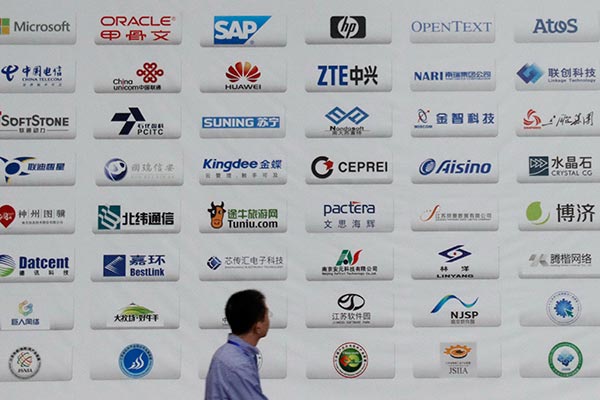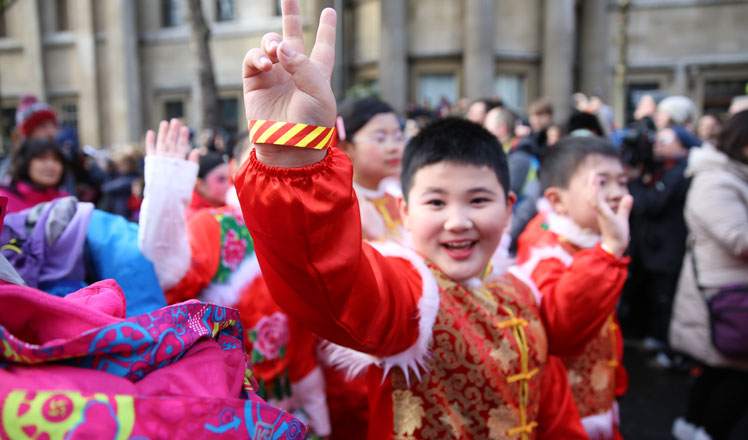Will Chinese corporate 'verbinouns' catch on?
Updated: 2016-02-18 07:56
By Nick Bevens(China Daily)
|
||||||||
 |
|
A visitor walks past a wall of trademarks of participating companies at an international industrial exhibition center in Nanjing, Jiangsu province.[DONG JINLIN / FOR CHINA DAILY] |
Microsoft Inc's former chief executive Steve Ballmer offered a brilliant example of what I mean, when he said he picked "Bing" for its new search engine's name, because it "worked globally" and could potentially, "verb up".
He was clearly dreaming of the moment when we all "Bing" for a fact or service, rather than "Google".
And, of course, there's the industrial "verbinoun" (verb or noun) daddy of them all.
"Googling" is the world's most frequent online action today and a process that's generated unequaled free conversational publicity in every corner of the globe for its namesake.
Having your brand or company embraced into the vernacular makes it ubiquitous, needed, and most potentially lucrative of all, even loved.
Consumers latching in their billions onto a name through such "wordification" is marketing gold dust, as their use is invariably followed with buying or using the product in question.
According to Keller Fay Group, which measures the effects of everyday social influences, the average American now mentions specific brands 56 times a week just in their routine conversations.
An older, but equally dominant example in its own sector is "to Fedex", which has been mainstream language for years because it's just better and more fun than saying "deliver that package overnight".
For even longer, many have asked for a Band-Aid to cover a graze rather than a sticking plaster, a Kleenex rather than a tissue, or to have something Xeroxed rather than taking a photocopy.
In Britain, "to Hoover" has effectively replaced, to vacuum. We "Astroturf" when we lay all-weather patches of grass, "Tarmac" when resurfacing roads, or simply "Sellotape", if sticking things together.
More recently, I'd wager if you think, "I must buy a tablet computer", there's a strong chance you'll actually say something beginning with "i".
All these names are protectively trademarked. But they're free to use verbally because we simply like using them.
Knit your brand or firm into consumer chatter, and blockbuster sales and market share will surely follow-but only, of course, if your verbinoun's use is followed quickly by a purchase of your product, not someone else's that does the same thing.
The most recent trend has been to pin two words together to make one: ie "to Facebook, YouTube, Powerpoint, or Photoshop".
But tellingly, this ongoing global fondness for corporate colloquial is yet to rub off on Chinese giants, outside of their own shores at least, despite the country's creation of some of the world's most modern and nimble technology and digital leaders.
In Europe and the United States, millions are already "Ubering" a ride home, so maybe "Didi-ing" might eventually become more popular worldwide.
I'm an addicted "eBayer", but might I convert to "Taobaoism"? Or instead of Googling, might everyone ultimately turn to Baiduing?
I enjoyed an outing last week to what the family calls Wuhan's "Wandaland"-an area where the big-spending property steamroller appears to have taken over, building entire shopping streets and entertainment complexes.
My wife already spends hours happily "Jingdonging" (shopping on JD.com), which also has a happy ring to it, so there's a real possibility of global spread.
Will a world already with a fierce hunger of all-things-electronic, ever be sated in the future by "Huawei-ing" or "Haier-ing"?
But if any potential Chinese verbinouns are ever to be adopted globally, something drastic has to change.
In some markets still, China Inc's image remains weak to win over the level of public warmth needed to be verbed or nouned "up".
Overseas moves by Chinese companies are sometimes viewed with suspicion, rather than welcomed with open arms.
As Chinese companies' influence spreads, their marketers must think hard about how the world might actually start to like China's goods and services better.
Only then, might a new vocabulary of cherished Sino-catchwords stand a chance of finding their way onto the tips of global consumer tongues.
- One of the two dead sperm whales in East China salvaged
- Paid menstrual leave provokes controversy in China
- MIT establishes supply chain education center in China
- 20,000 yuan eaten by ants gives artist a frame for inspiration
- Chinese military sets up corruption hotline
- Foreigners working in Beijing can now buy apartments immediately
- 'Grim Sleeper' murder trial begins six years after arrest
- Cameron defends EU deal as lawmakers offer no guarantees
- Sarkozy placed under investigation in campaign funding probe
- Moscow dismisses accusation of Russia bombing Syrian hospitals
- 2016 Westminster Kennel Club Dog Show held in New York
- Pakistan confirms participation in Saudi-led military drills

 One of the two dead sperm whales in East China salvaged
One of the two dead sperm whales in East China salvaged
 Armless student pursues painting dream
Armless student pursues painting dream
 62-year-old folk artist carries on firecracker dragon lantern
62-year-old folk artist carries on firecracker dragon lantern
 Bridge expert's former home converted to restaurant
Bridge expert's former home converted to restaurant
 Excitement, charm and grace: Chinese New Year in UK
Excitement, charm and grace: Chinese New Year in UK
 Taylor Swift wins Album of the Year at Grammys
Taylor Swift wins Album of the Year at Grammys
 Stars spotted at film academy exam in China
Stars spotted at film academy exam in China
 Record number of Chinese travel abroad for Spring Festival
Record number of Chinese travel abroad for Spring Festival
Most Viewed
Editor's Picks

|

|

|

|

|

|
Today's Top News
Will US-ASEAN meeting be good for region?
Accentuate the positive in Sino-US relations
Dangerous games on peninsula will have no winner
National Art Museum showing 400 puppets in new exhibition
Finest Chinese porcelains expected to fetch over $28 million
Monkey portraits by Chinese ink painting masters
Beijing's movie fans in for new experience
Obama to deliver final State of the Union speech
US Weekly

|

|







